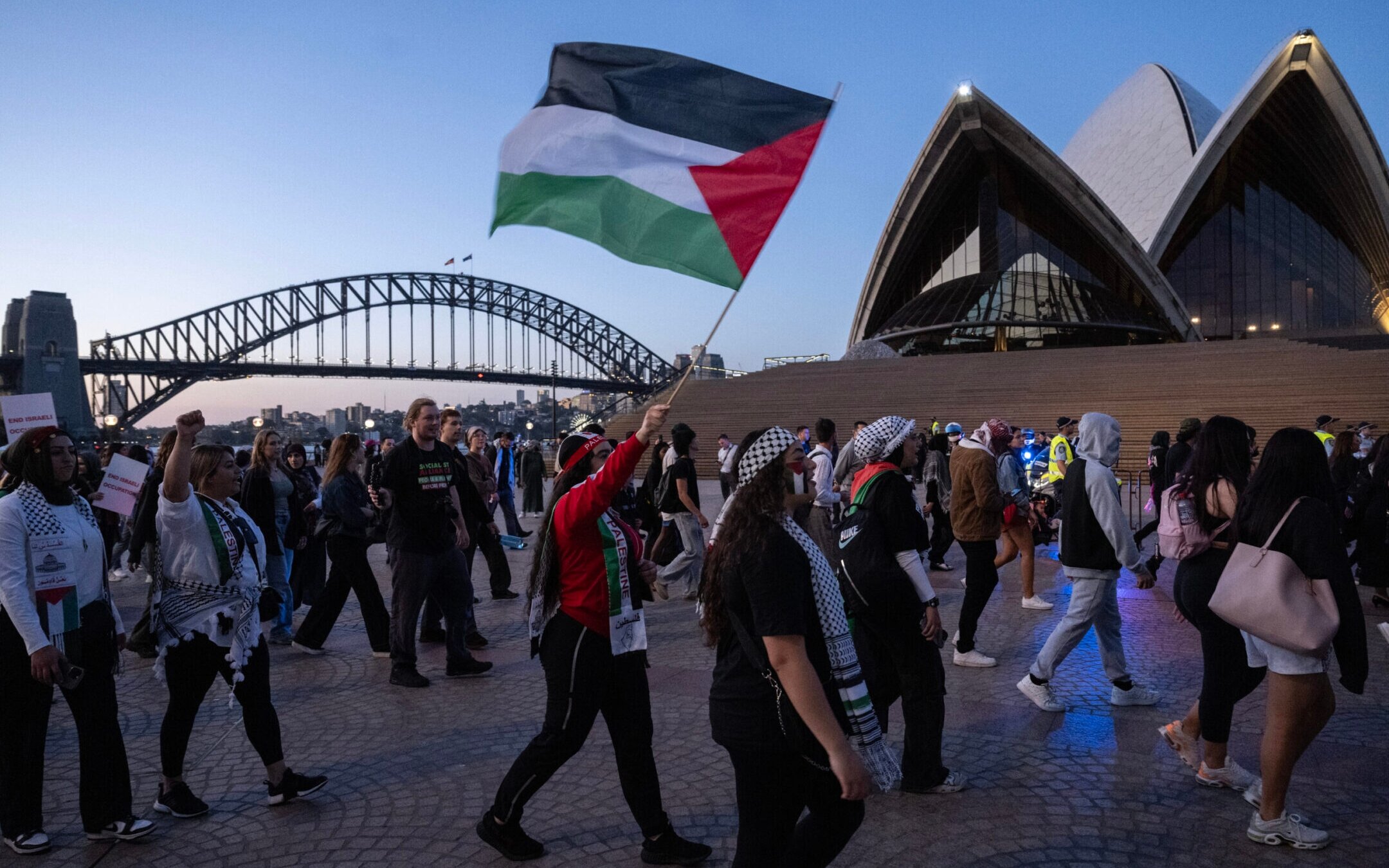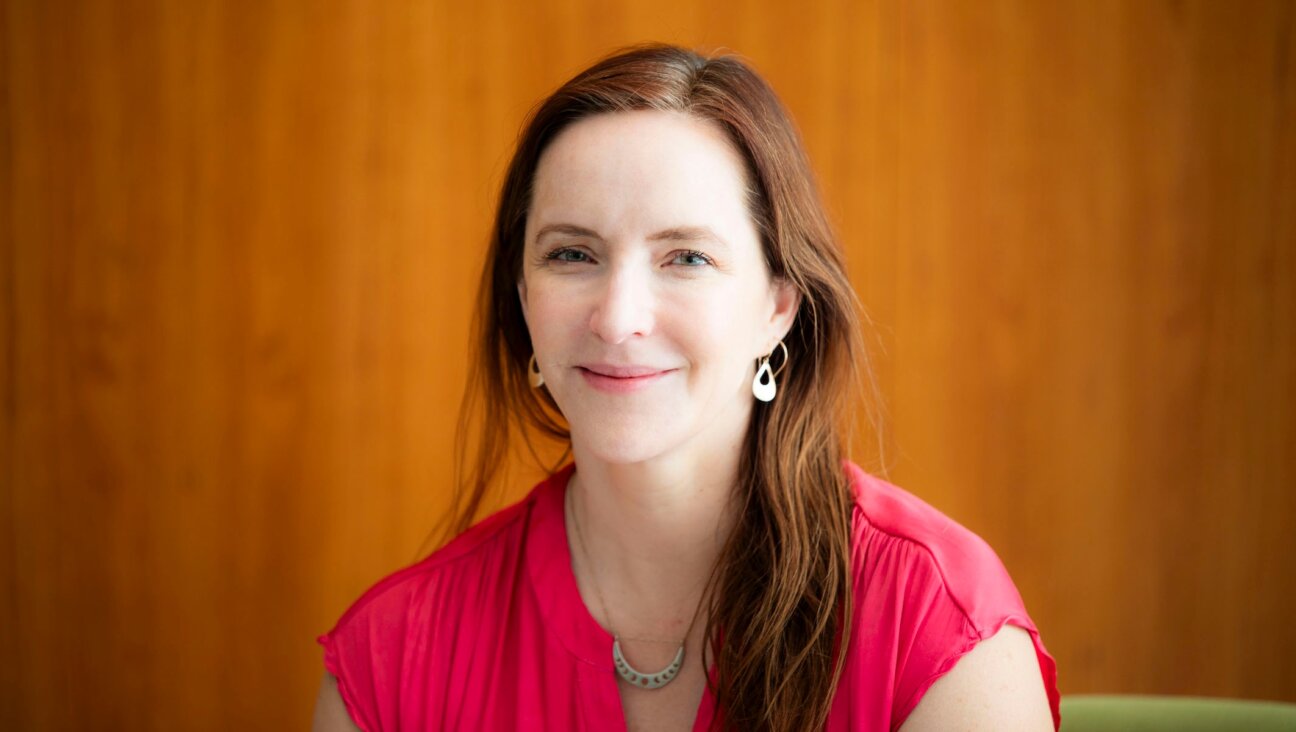Australian Jews on high alert after public list of ‘Zionists’ fuels harassment
At least one family has gone into hiding, said a Jewish lawmaker

Pro-Palestinian protesters rally in front of the Opera House in Sydney, Oct. 9, 2023. (Louie Douvis / The Sydney Morning Herald via Getty Images)
(JTA) — Australian police are investigating threats against a 5-year-old Jewish child amid an uproar over the publication online of a list of hundred of Jewish creatives’ personal information by pro-Palestinian activists.
Hundreds of Jewish academics and creatives who joined a private WhatsApp group last year had their personal information shared publicly by prominent pro-Palestinian activists this week.
At least one family has gone into hiding amid ensuing harassment, Josh Burns, a Jewish Australian lawmaker, said during a radio interview on Friday morning, prompting shock from the interviewer.
“They were completely shattered by this whole experience, where a sort of lynch mob of people were attacking them,” Burns said. “We’re not talking about people who are in any way connected to the conflict in the Middle East. We’re talking about ordinary Australian citizens who happen to be Jewish.”
Defenders of the list and its release have said that some people on it have sought to silence pro-Palestinian voices in the months since Hamas attacked Israel, triggering a war in Gaza. The feminist writer Clementine Ford, who shared the list with her 250,000 followers on Instagram, claimed anti-Zionist Jews had leaked the information from the WhatsApp group.
The incident comes amid growing concern among Australia’s Jews about their safety because of the war’s repercussions.
“We are hearing awful stories about Jewish individuals and families being the subject of harassment and vilification and we are aware of instances where Jewish homes and businesses have been targeted and vandalized simply because they haven’t denounced Israel or their people to the standard demanded by some radical nudnik,” Rabbi Dovid Gutnick of East Melbourne told the Herald Sun newspaper this week.
The newspaper reported that some Jews are moving out of heavily Jewish neighborhoods in Melbourne to avoid harassment. In one case, the newspaper said, the target was a couple who are Jewish but have not commented publicly about the war. They received a photograph of their 5-year-old child with the note reading, “We know where you live.”
Alex Ryvchin, co-CEO of the Executive Council of Australia Jewry, said in a statement that the list called to mind those created by the Nazis as they sought to murder the Jews of Europe.
“There is great shock and disbelief that people are once again drawing up lists of Jews,” Ryvchin said. “It has been said to me by numerous community members that they feel relief that their parents or grandparents who survived the Holocaust are not alive to see this.”
The incident follows an announcement by police in the Sydney region that they had determined that protesters said to have shouted “Gas the Jews” at a rally outside the city’s famous Opera House shortly after Oct. 7 had not actually uttered the phrase, which calls to mind the gas chambers of the Holocaust. They were actually saying, “Where’s the Jews,” concluded a report issued last week.
Ryvchin rejected the finding but said that even if it were accurate, it would be distressing.
“Even taking aside the history of the Holocaust and that context, on a plain reading interpretation of the phrase ‘Where’s the Jews’ by an angry mob of that sort, clearly they were looking for Jews, and what would they have done had they found them?” he said. “That’s what we think and that’s what we feel and that’s what needs to be acted against.”
Burns, a liberal politician whose grandmother was a refugee from Nazi Germany, said he, too, had heard widespread concern. He noted that he shared distress about the Palestinians and would support all expressions of pro-Palestinian sentiment that did not infringe on the safety of others.
“If you ask any member of the Jewish community about this doxxing issue, every single member of the Jewish community would respond with how frightening this is, that they have never experienced anything like this, that this social media phenomenon of putting up people’s individual profiles is one of the most frightening and unprecedented experiences of Jewish people in Australia and it shakes them to the core,” he said.
This article originally appeared on JTA.org.
A message from our Publisher & CEO Rachel Fishman Feddersen

I hope you appreciated this article. Before you go, I’d like to ask you to please support the Forward’s award-winning, nonprofit journalism during this critical time.
We’ve set a goal to raise $260,000 by December 31. That’s an ambitious goal, but one that will give us the resources we need to invest in the high quality news, opinion, analysis and cultural coverage that isn’t available anywhere else.
If you feel inspired to make an impact, now is the time to give something back. Join us as a member at your most generous level.
— Rachel Fishman Feddersen, Publisher and CEO






















